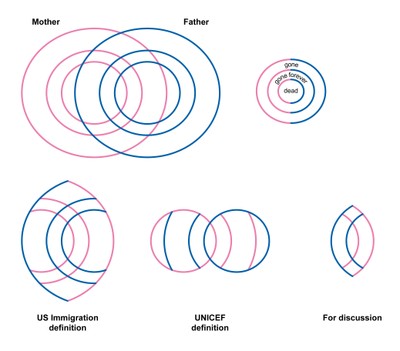Haiti Orphan Appeal: Definition of an orphan

Haiti Orphan Appeal: Definition of an orphan. The question comes into focus when some people think orphan means "good for adoption"
Before people declare children to be orphans and try to remove them from their home country, we need to think about definitions. We have already pointed out the irresponsible exaggeration of orphan numbers where people who should have known better again claimed millions of orphans when perhaps ten thousand will have actually lost both parents for good.
"Orphans" are defined in different ways. Looking at the human problems of Aids Orphans, a broad definition of children with parental loss needing support is used:
UNICEF and UNAIDS use “orphan” to describe a child who has lost either one or both parents; the organization use the terms “maternal orphan”, “paternal orphan”, and “double orphan” to describe a child who has lost its mother, father, or both parents, respectively. (See footnote on page 13 of the UNAIDS Global Report 2008.) This definition gives a total of 143 million orphans in the world and might be a measure for children needing special help from society because of parental loss. This is shown on the Venn diagram in the middle of the bottom row.
This definition might be good for raising public sympathy but is not good for discussion removal of children from their home culture for a "better" life abroad.
However under U.S. immigration law, "a foreign-born child is an orphan if he or she does not have any parents because of the death or disappearance of, abandonment or desertion by, or separation or loss from, both parents". To adopt a child as an orphan from abroad into the USA the child has to be bereft (have lost) care of both parents but neither parent needs to be dead. This large group is shown at the left hand bottom of the diagram.
The logic behind this, that it may not be relevant to the child if there is a parent unknown to them somewhere in the world, is strong. Indeed we call ourselves an "orphan charity" even though many of the children we care for probably have living parents, of whom they are permanently bereft. But what is missing from the US definition is a sense of permanence. In our view a child should only be considered an orphan is they are permanently bereft of the care of both parents. And the permanent or irreconcilable failure of parental care should be an absolute minimum requirement for an international adoption. The group who are open to discussion and may or may not be suitable for international adoption are on the right of the bottom row.
Of course "permanence" is impossible to prove in law but the establishment of beyond reasonable doubt seems a good basis. We have reunited children with their parents years after the genocide in Rwanda and no international process should be capable of standing in the way of such a happy occurence.

 Return to Schools Wikipedia Home page…
Return to Schools Wikipedia Home page…
